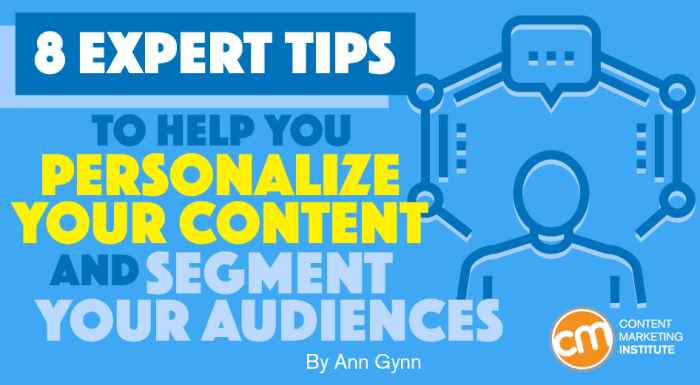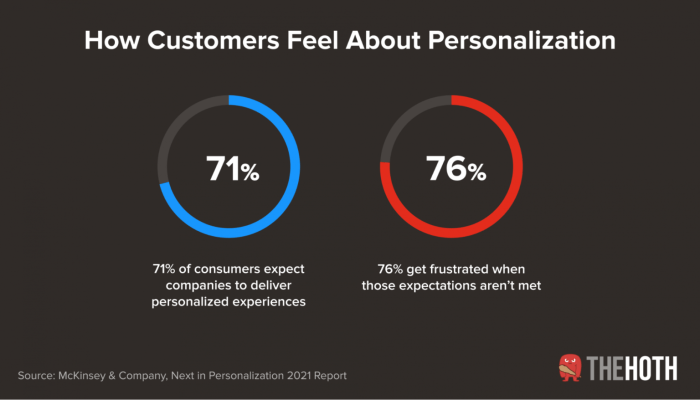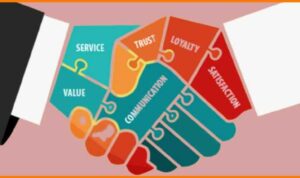Content Personalization Tips sets the stage for this enthralling narrative, offering readers a glimpse into a story that is rich in detail with american high school hip style and brimming with originality from the outset.
In a world where customization reigns supreme, understanding the importance of content personalization is key to capturing and retaining audience attention. From data-driven techniques to AI integration, this guide dives into the realm of personalized content strategies to help you stand out in the digital landscape.
Importance of Content Personalization

Content personalization is crucial for engaging users in today’s digital landscape. By tailoring content to individual preferences and behaviors, businesses can create a more personalized and relevant experience for their audience. This not only increases user engagement but also helps build brand loyalty and trust.
Improved User Experience
Personalized content can greatly improve user experience by providing customers with content that is specifically tailored to their needs and interests. This leads to higher levels of engagement, increased time spent on site, and ultimately, a more positive overall experience for the user.
Impact on Conversion Rates
The impact of personalized content on conversion rates is significant. By delivering content that resonates with users on a personal level, businesses can increase the likelihood of conversions. Whether it’s making a purchase, signing up for a newsletter, or filling out a form, personalized content can guide users through the conversion funnel more effectively, resulting in higher conversion rates and ultimately, increased revenue for the business.
Strategies for Effective Content Personalization
In order to effectively personalize content for your audience, it is important to utilize data-driven techniques, leverage AI capabilities, and segment your audience appropriately.
Data-Driven Personalization Techniques
- Utilize user behavior data such as browsing history, purchase history, and interactions with your content to tailor personalized recommendations.
- Implement A/B testing to analyze which personalized content performs best with different segments of your audience.
- Use customer feedback and surveys to gather insights for creating more personalized content experiences.
Role of AI in Content Personalization
AI can help analyze vast amounts of data to identify patterns and trends, enabling marketers to personalize content at scale and in real-time.
- AI-powered algorithms can predict user preferences and behaviors, allowing for more accurate content recommendations.
- Machine learning models can continuously optimize content personalization based on user interactions and feedback.
- AI can automate the process of content customization, saving time and resources while improving the overall user experience.
Tips for Segmenting Audiences for Personalized Content
- Define clear audience personas based on demographic information, interests, and behavior patterns.
- Use segmentation criteria such as location, age, purchase history, and engagement level to create targeted content for different audience segments.
- Regularly review and update audience segments to ensure content personalization remains relevant and effective.
Implementing Personalization Across Different Channels

To effectively implement personalization across different channels, it is essential to tailor content specifically for each platform to engage with the audience in a meaningful way.
Personalizing Content for Websites
When personalizing content for websites, consider using dynamic content blocks based on user behavior or preferences. Utilize cookies to track user interactions and provide personalized recommendations. Implementing chatbots or live chat features can also enhance the user experience by offering personalized assistance.
Strategies for Personalized Email Marketing Campaigns
– Segment your email list based on demographics, behaviors, or past interactions.
– Personalize email subject lines and content to increase open rates.
– Use dynamic content to tailor emails based on user preferences or engagement history.
– Incorporate personalized recommendations or exclusive offers to drive conversions.
– A/B test different personalization strategies to optimize email performance.
Tips for Personalizing Content for Social Media Platforms
– Analyze audience data to understand preferences and interests.
– Create tailored content for each social media platform to maximize engagement.
– Utilize user-generated content or interactive polls to encourage participation.
– Respond to comments and messages in a personalized manner to build relationships.
– Implement social listening tools to track mentions and sentiment, allowing for real-time personalization opportunities.
Tools and Technologies for Content Personalization: Content Personalization Tips
When it comes to content personalization, utilizing the right tools and technologies can make a significant difference in the effectiveness of your strategies. Let’s explore some popular tools used for content personalization, the benefits of AI-powered personalization tools, and examples of successful implementations of personalization technologies.
Popular Tools for Content Personalization
- 1. Optimizely: This tool allows you to create personalized experiences for your website visitors based on their behavior and preferences.
- 2. HubSpot: HubSpot offers a suite of tools for personalized marketing, including email personalization and content recommendations.
- 3. Adobe Target: Adobe Target helps you deliver personalized content across different channels, such as websites and mobile apps.
Benefits of AI-Powered Personalization Tools
Using AI-powered personalization tools can enhance the effectiveness of your content personalization efforts in several ways:
- 1. Increased Efficiency: AI algorithms can analyze data at a much faster rate than humans, allowing for real-time personalization.
- 2. Improved Accuracy: AI can identify patterns and trends in user behavior to deliver more relevant and targeted content.
- 3. Enhanced User Experience: Personalized content based on AI insights can lead to higher engagement and conversions.
Successful Implementations of Personalization Technologies, Content Personalization Tips
- 1. Netflix: Netflix uses AI algorithms to recommend personalized content to users based on their viewing history and preferences.
- 2. Amazon: Amazon leverages personalization technologies to provide tailored product recommendations and personalized shopping experiences.
- 3. Spotify: Spotify uses AI to create personalized playlists for users based on their listening habits and preferences.





